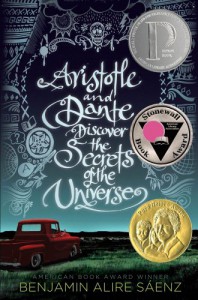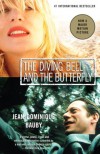Currently reading
Aristotle and Dante Discover the Secrets of the Universe by Benjamin Alire Sáenz

First of all: many, many thanks to my wonderful friend the scarecrow for gifting me a copy of this book, along with The Cuckoo's Calling! Go check out her reviews. They're hilarious, eloquent, and I now have a 'to-read' list as long as my arm. :)
How refreshing it is to just settle down with a book, and for once, not be transported to some faraway world where fantasy rules, but to where the most important focus of the story is friendship. Yes, I am aware that last sentence was simply dripping with sap. But Aristotle and Dante Discover The Secrets of the Universe (or AADTSOTU, as I'm calling it for the sake of brevity), managed to hit this wonderful point within me, where I at once recalled exactly how I felt during my teenage years, and was able to sympathise fully with both Dante and Aristotle.
Now, normally I am sent running a mile in the opposite direction by any novel that is about teenagers and their emotions. I'm hardly an old fogey in my early twenties, but the majority of books I've read in which the teenagers were disagreeable little sods who constantly feigned that they were deep and mysterious is enough for me to have made the judgement that I would stop reading any books in that same vein. Really, you can blame Dash from Dash and Lily's Book of Dares for that.
If the main characters in a novel are teenagers, that's fine. If its main characters are teenagers who feel out of place in the big world and see the frightening approach of adulthood – it's on shaky ground, but otherwise fine. If they go on about their emotions the whole time – NOPE NOPE NOPE.
However, AADTSOTU proved to me that the above formula can work, so long as the author casts his mind back to his teenage years, and realises: “Hey, I didn't read Charles Bukowski. I didn't sit around listening to The Smiths all day and thinking I was cleverer than my peers. I didn't understand a word of Charles Baudelaire's poems. I was just a regular teenager who occasionally worried about my place in the universe.”
Take some time out to applaud, people. That's a much more honest interpretation of your teenage years than being the smart aleck kid who was hyperlexic and into maths, 'a philatelist trapped by unknowable anguish', and/or had a hobby of memorising the last words of famous historical figures, or offered their own deep and introspective look into teenage life. The extract below makes me actually believe that this is a conversation going on between two young friends struggling to find their feet in the world.
'The quiet over the phone was strange. “Do you think it will always be this way?”
“What?”
“I mean, when do we start feeling like the world belongs to us?”
I wanted to tell him that the world would never belong to us. “I don't know,” I said.
“Tomorrow.”'
(Page 88)
In fact, the scarecrow and I had a conversation about how AADTSOTU often read like a John Green book that stripped away all of its frills and just got down to brass tacks – an enjoyable story capturing the life of two real teenagers. Sure, Dante and Aristotle have their moments where they ponder deeply about life, but it always comes up as a natural point in their conversations, or Dante's viewpoint of the world. They actually grow and develop throughout the novel, which is wonderful to watch – they're not instantly these purveyors of deep and wise thoughts about being on the cusp of adulthood. Other authors might have just slapped Dante and Aristotle's conflicts up right, front and centre, but no. Here they're just quietly addressed, with the focus simply being on the friendship between Ari and Dante.
I love the sheer simplicity of Alire Sáenz's writing. He's also one of those writers who can emotionally uppercut you out of nowhere with a carefully crafted and placed sentence, or even a full paragraph.
'“Dante's my friend.” I wanted to tell them that I'd never had a friend, not ever, not a real one. Until Dante. I wanted to tell them that I never knew that people like Dante existed in the world, people who looked at the stars, and knew the mysteries of water, and knew enough to know that birds belonged to the heavens and weren't meant to be shot down from their graceful flights by mean and stupid boys. I wanted to tell them that he had changed my life and that I would never be the same, not ever. And that somehow it felt like it was Dante who had saved my life and not the other way around. I wanted to tell them that he was the first human being aside from my mother who had ever made me want to talk about some of the things that scared me. I wanted to tell them so many things and yet I didn't have the words.'
(Page 309)
'The day he came home from the hospital, he cried. I held him. I thought he would never stop.
I knew that a part of him would never be the same.
They cracked more than his ribs.'
(Page 325)
Aristotle and Dante are two boys brought together by fate. Aristotle is angry because he feels like his family are keeping secrets from him, and he's struggling to come to terms with growing up. Dante, on the other hand, is patient, understanding, and attracted to Aristotle the moment they lay eyes on each other at the local swimming pool. The two boys strike up a friendship that is warm, genuine, loving, and... words really fail me. This book is just lovely. It's like a nice warm bath you can sink into. A bath that comes with a function that punches you in the gut every few chapters.
I really loved Ari's voice, which struck a good balance between being dry and sullen, yet carrying a range of emotion. You can hear the cracks in Ari's voice when terrible things happen later on in the novel, and it's heartbreaking. Alire Sáenz certainly didn't restrict himself by writing from the perspective of one main character. I came out of this book feeling like I know both boys incredibly well, and of course, I had a little bit of a tear in my eye on the last page. That's the sign of a skilled writer to me – one who can balance the voice of his characters and not write: “The Adventures of My Flawed Protagonist! ...And His Friend.”
Nope. Both boys have equal representation in the eyes of the author. Ari might be the voice of the novel, and Dante moves away for quite a good portion of the book, but that doesn't mean Alire Sáenz just forgets about him. The characters grow, develop and change. Aristotle isn't the person that Dante left behind when he moves away for a year. Dante's markedly different too, but AADDTSOTU doesn't make a show of that. There's just subtle hints and changes in priorities for both boys as they transition from boys to men.
It's not just Aristotle and Dante who carry the book, though. Whilst Dante's parents are presented as a fairly perfect couple, Aristotle views his parents as deeply unsound. They love him on the outside, but they keep these secrets from him and Ari feels rather despondent because of it. His mother will never talk to him about his brother, who is serving a jail term, and his father refuses to speak about his time serving in Vietnam, and is emotionally distant from his son.
I really don't want to spoil this book, but there is this brilliant moment towards the end where Ari realises that he's made his mother cry by bringing up some bad memories for her, and she's now terrified that Aristotle will walk the same path as his brother. It's not like Aristotle doesn't have the chance to learn about his brother – there's a box with all of his brother's information in the dining room that he occasionally comes into contact with. However, Ari doesn't think he's ready for it, and knows it would upset his family if he confronted them with the truth. Far from being the angry young man from the beginning of the story, he's now a lot more empathic and open, and I adored that.
The ending, by the way, is absolutely beautiful and worth the price of admission alone. I say I had a tear in my eye, but bear in mind, it's not a sad ending. It's extremely uplifting and the final few chapters manage to tie up all the loose ends in one simple motion. I really don't wish to spoil it, because it's incredibly heartfelt and deserves to be read without any spoilers to mar one's enjoyment.
'My father was right. And it was true what my mother said. We all fight our own private wars.'
(Page 359)
To sum it all up – in the immortal words of our friends over at Tumblr, this book gave me the 'feels'. It has absolutely wonderful characters, and a simple yet beautifully crafted story about two teenagers growing up and pondering where they fit into the universe, and what secrets it may hold. Why are friends so important? What is love like, and how do you know when you come to experience it for the first time? When are you supposed to do 'adult' things, and why do they feel like they've suddenly been sprung on us, like one moment we were young and carefree, and now we need to arrange getting a driving licence and finding a job? Questions all of us have probably asked growing up. AADDTSOTU addresses them in its own, lovely little way and it's an absolutely stellar read I would recommend to anyone.
5/5.







